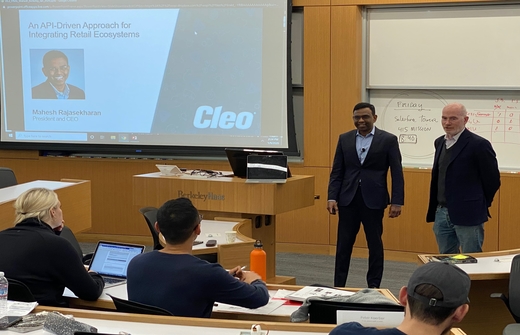Sharing the Value of Ecosystem Integration at Haas School of Business

Learning how to deliver value in whatever it is you do in life is a lesson that resonates with people of any age.
For the students at the Haas School of Business at the University of California, Berkeley, they received a crash course this week in creating sustainable value through ecosystem integration.
Mahesh Rajasekharan, Cleo President and CEO, and an alumnus of Haas, spoke to students at Professor Greg La Blanc’s digital transformation course about that very topic. Digital transformation is having such an impact on the world today, and as integration technology evolves, the competitive landscape has completely changed.
“To become agile, and to ensure you are prepared for any kind of disruption, you first need to stop looking at integration as a goal in itself,” Rajasekharan said. “Integration is a strategic means to an end.”
Rajasekharan’s discussion, ‘An API-Driven Approach for Integrating Retail Ecosystems,’ revolved around the importance of APIs and how central they are to enterprises around the globe. But perhaps the topic that caught the classes attention the most focused on the Amazon effect.
The Amazon Effect
The Amazon Effect, Rajasekharan said, comprises both the EDI and API marketplace to redefine the e-commerce experience. Starting with one- and two-day shipping, the transactional dynamics of the supply chain ecosystem has been completely restructured. Utilizing a blend of real-time and batch processes is required in order to solve this cost efficiently.
In order for companies across the supply chain to remain competitive, they must take advantage of modern technology to integrate systems and applications while supporting data-driven business processes with the members of their digital ecosystem, from trading partners and suppliers to customers. Doing this in addition to allowing for speedy delivery puts enterprises in the best position to succeed.
“The Amazon Effect is causing upstream pressure on ecosystems to respond with agility, at low cost,” Rajasekharan said.
For Professor La Blanc’s students, they are already well aware of the importance of staying ahead of the curve in business. The Haas School of Business, one of the most prestigious in the country, encourages its students to live a distinctive culture by embracing four defining leadership principles:
- Question the Status Quo – Haas students make progress by speaking their minds even when it challenges convention
- Confidence Without Attitude – Haas students make decisions based on evidence and analysis
- Students Always – Haas students are a community designed for curiosity and a lifelong pursuit of personal and intellectual growth
- Beyond Yourself – Haas students lead ethically and responsibly, taking the longer view in decisions and actions by putting larger interests above personal gain
Combining these four principles with the understanding of the impact of ecosystem integration is a valuable lesson the Haas students can learn from throughout their careers.
The API Revolution in Logistics Companies is Impacting Retail
As we all know, logistics companies are the glue that binds the physical-goods world to e-commerce. Consumer retail experiences are tightly related with last-mile logistics, even down to real-time truck location and delivery estimates. But going one step further, Rajasekharan said, safety regulations (such as electronic logging devices or ELD) have turned every single truck into an Internet of Things (Iot) device to produce valuable data.
All of this – caused by the so-called ‘Amazon Effect’ – is driving massive change in retail, manufacturing, wholesale, and logistics. That’s why having the ability to combine APIs and EDI on a single platform can provide endless capabilities. Logistics companies, for example, need the best of both worlds, Rajasekharan said, so that they can expand their ecosystems beyond their existing trading partner network by using traditional sets of transactions.
Digital Transformation is Real
Integration technology is all about enabling supply chain agility. For Professor La Blanc’s students, they learned this week that in order to create that value, the end goal of an integration strategy is through a highly resilient supply chain that’s comprised of optimized processes and efficient integration points.
As Rajeskharan explained, you need a well-oiled ecosystem to enable your business to adapt quickly and evolve as technology changes.

About Cleo
